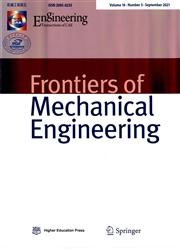下颌种植体增材制造的范围综述
IF 4
2区 工程技术
Q1 ENGINEERING, MECHANICAL
引用次数: 0
摘要
骨病和骨折是年复一年变得越来越普遍的健康问题之一。下颌关节紊乱是由于事故或疾病导致人类面部最大、最强壮的骨骼受损。由于下颌骨的自然愈合过程需要很长时间,因此需要使用骨移植程序来加快患者的康复。由于骨移植过程(如亲笔签名、同种异体签名和异种移植物)的局限性,正在通过3D打印使用生物材料开发骨替代物。本综述的目的是评估3D打印在下颌骨置换中的应用研究。搜索算法在搜索开始时发现多达2941篇文章,在初始选择后发现123篇文章。截至2022年2月,Scopus电子数据库用于进行文献检索。这项研究包括使用3D打印机、增材制造或有限元分析来构建或分析下颌植入物的出版物。本研究包括工程学、材料科学、生物化学、遗传学、分子生物学、医学、牙科、化学工程和计算机科学的论文主题。本研究排除了物理学、天文学和能源方面的论文、书籍章节文件类型、论文综述以及英语以外语言的文件。经过包括年份、出版阶段、来源类型和语言在内的初步筛选,获得了多达70篇文章,过滤标题和摘要后获得了55篇文章。在获得全文选择后,本综述共收录了32篇文章。有些文章是不可接受的,因为讨论的主题与下颌骨支架无关。因此,用于下颌骨缺损修复和重建的增材制造领域需要开发新的工具和方法。可以根据各种下颌骨缺损的特点,使用适当的3D打印工艺创建定制的生物支架,使其与缺损区域完美匹配,降低应力,从而提高支架的愈合功能。本文章由计算机程序翻译,如有差异,请以英文原文为准。
A scoping review of the additive manufacturing of mandibular implants
Bone disease and fractures are among the health issues that are becoming more prevalent year after year. A mandibular disorder is caused by an accident or disease to the largest and strongest bone in the human face. Because the natural healing process of mandibular bones takes a long time, a bone grafting procedure is used to speed up the patient’s recovery. Due to the limitations of bone grafting processes such as autographs, allographs, and xenografts, bone replacement is being developed using biomaterials via 3D printing. The purpose of the review was to evaluate research on the use of 3D printing in the replacement of mandible bones. The search algorithm found as many as 2,941 articles at the start of the search and 123 articles after initial selection. Up to February 2022, the Scopus electronic database was used to conduct the literature search. This research includes publications that employ 3D printers, additive manufacturing, or finite element analysis to build or analyze mandibular implants. Paper topics in engineering, materials science, biochemistry, genetics, molecular biology, medicine, dentistry, chemical engineering, and computer science are included in this study. Papers in physics, astronomy, and energy, book chapter document types, papers reviews, and documents in languages other than English were excluded from this study. After an initial screening that included the year, publication stage, source type, and language, as many as 70 articles were obtained, and after filtering titles and abstracts obtained 55 articles. After the full-text selection was obtained, 32 articles were included in this review. Some articles were unacceptable because the topics discussed were unrelated to mandibular bone scaffolds. As a result, the field of additive manufacturing for the repair and reconstruction of mandibular defects necessitates the development of novel tools and methodologies. A customized biological scaffold can be created using an appropriate 3D printing process based on the characteristics of various mandibular defects, allowing it to be perfectly matched to the defect region and reducing stress, thereby improving the scaffold’s healing function.
求助全文
通过发布文献求助,成功后即可免费获取论文全文。
去求助
来源期刊

Frontiers of Mechanical Engineering
Engineering-Mechanical Engineering
CiteScore
7.20
自引率
6.70%
发文量
731
期刊介绍:
Frontiers of Mechanical Engineering is an international peer-reviewed academic journal sponsored by the Ministry of Education of China. The journal seeks to provide a forum for a broad blend of high-quality academic papers in order to promote rapid communication and exchange between researchers, scientists, and engineers in the field of mechanical engineering. The journal publishes original research articles, review articles and feature articles.
 求助内容:
求助内容: 应助结果提醒方式:
应助结果提醒方式:


